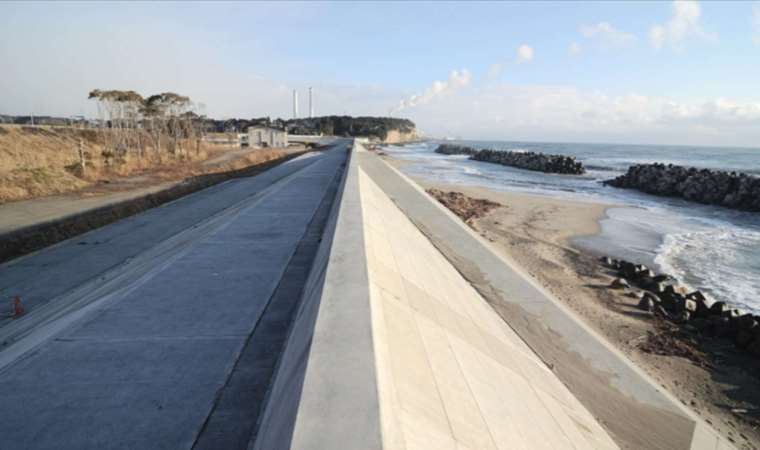Japan begins evacuating radioactive water from Fukushima nuclear power plant
China calls Tokyo's decision ‘gambling with global marine environment,' suspends all imports of aquatic products from Japan

Japan has commenced the release of treated nuclear waste from the damaged Fukushima power plant into the sea, despite opposition from fishing communities and China.
The discharge of water began at approximately 1:00 p.m. local time (0400GMT).
During the first phase, the operator, Tokyo Electric Power Company (TEPCO), will dilute roughly 7,800 tons of treated water with seawater, and this diluted mixture will be gradually released over a span of 17 consecutive days.
According to Japanese broadcaster NHK, the entire process could extend over at least 30 years.
TEPCO has already filled a facility known as a discharge vertical shaft with the treated and diluted water.
Each ton of treated water is blended with about 1,200 tons of seawater.
Within the TEPCO complex, there is an estimated 1.3 million tons of treated water, and the operator is grappling with limited storage capacity, prompting Japan to opt for releasing the water into the ocean.
TEPCO has devised plans to release approximately 31,200 tons of water, stored in 30 tanks, throughout this year.
Earlier this month, the operator discovered a hole in a hose used for transferring treated water. Subsequently, authorities detected higher-than-usual levels of radioactive material in rainwater near a storage tank.
The International Atomic Energy Agency has stated that the release of nuclear waste would have a negligible radiological impact on people and the environment. However, it has declined to endorse Tokyo's decision.
In March 2011, a magnitude 9.0 earthquake triggered a tsunami that knocked out the backup electric supply at the power plant on Japan's northeastern Pacific coast, leading to meltdowns in three of its reactors.
Criticism
Japan is not only grappling with diplomatic challenges but also facing internal criticism from fishing communities regarding this move.
However, Tokyo has announced financial relief for those affected by the decision.
Following Tokyo's commencement of treated nuclear waste release, China has taken the step of suspending all imports of aquatic products from Japan. Beijing had previously issued a warning about potential actions if Tokyo proceeded with its plan.
The Chinese Foreign Ministry summoned Japanese Ambassador Hideo Tarumi on Tuesday, urging Tokyo "to reconsider its decision." Vice Foreign Minister Sun Weidong conveyed to Tarumi that Japan is risking the global marine environment and the well-being of humanity by pushing forward with the discharge of nuclear-contaminated water into the sea.
Meanwhile, South Korea's primary opposition party, the Democratic Party, vehemently criticized Tokyo's plans. Lawmaker Lee Jae-myung expressed, "We strongly condemn Japan's release of nuclear-contaminated water," likening it to the Second Pacific War.
Nonetheless, South Korean Prime Minister Han Duck-soo, on Thursday, urged Japan to provide transparent information regarding the release of contaminated water from the crippled nuclear plant.
In Seoul, police reportedly detained at least 16 university students who attempted to enter the Japanese Embassy in protest of Tokyo's decision to release treated nuclear waste, as per Seoul-based Yonhap News Agency.
Furthermore, Hong Kong is taking action by imposing a ban on seafood imports from at least 10 regions in Japan.
Most Read News
-
 Israel arrests over 100 Palestinians in occupied West Ba
Israel arrests over 100 Palestinians in occupied West Ba
-
 Trump says China 'panicked' with retaliatory tariff deci
Trump says China 'panicked' with retaliatory tariff deci
-
 Germany criticizes Israel’s airstrikes on Syrian territo
Germany criticizes Israel’s airstrikes on Syrian territo
-
 Myanmar identifies 180,000 Rohingya in Bangladesh as 'el
Myanmar identifies 180,000 Rohingya in Bangladesh as 'el
-
 US not interested in 'negotiations about negotiations' o
US not interested in 'negotiations about negotiations' o
-
 Search and rescue efforts continue 7 days after deadly M
Search and rescue efforts continue 7 days after deadly M
-
 Gaza death toll passes 50,600 as Israeli army kills 86 m
Gaza death toll passes 50,600 as Israeli army kills 86 m
-
 China hits back at US with 34% tariffs, lawsuit in escal
China hits back at US with 34% tariffs, lawsuit in escal








